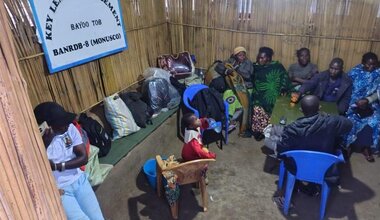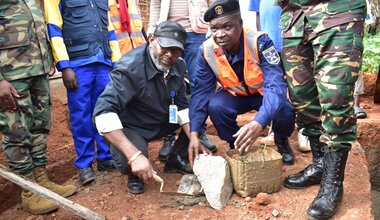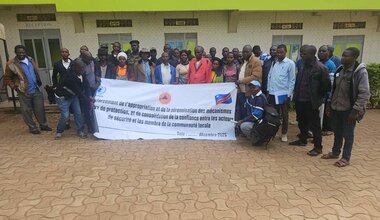Human rights violations during DRC general elections
Geneva/Kinshasa, 20 March 2012 – A UN report released Tuesday details serious human rights violations, including killings, disappearances and arbitrary detention, committed in Kinshasa by Congolese and security forces in the context of the 2011 presidential and legislative elections in the Democratic Republic of the Congo (DRC).
Geneva/Kinshasa, 20 March 2012 – A UN report released Tuesday details serious human rights violations, including killings, disappearances and arbitrary detention, committed in Kinshasa by Congolese and security forces in the context of the 2011 presidential and legislative elections in the Democratic Republic of the Congo (DRC).
The report, based on investigations conducted by the UN Joint Human Rights Office** in the DRC, documents the killing of at least 33 people in Kinshasa by security forces, between 26 November and 25 December 2011. The investigation found that at least 83 were wounded – mostly by bullets – and at least 16 people remain unaccounted for. More than 265 people were arrested and the majority of them were arbitrarily detained in various detention facilities in Kinshasa. There was also consistent, corroborated testimony of torture in detention.
Most of the reported violations involved Republican Guards, National Congolese Police – in particular agents of the Légion nationale d'intervention and agents of the Groupe mobile d'intervention – or the national intelligence agency. To a lesser extent, soldiers of the Armed Forces of the Democratic Republic of the Congo (FARDC) were also involved, according to the report.
Many of the reported violations targeted people because of their real or perceived affiliation to the political opposition party of Etienne Tshisekedi, the main opponent of President Joseph Kabila in the presidential elections or to a province where he reportedly enjoyed strong support.
Despite initial difficulties faced by the team during its investigation in accessing detention places, victims and witnesses, the UN Joint Human Rights Office noted the engagement of the government to address the reported violations, after having reviewed and commented on the report.
The Special Representative of the Secretary-General for the Democratic Republic of the Congo and Head of MONUSCO**, Roger Meece strongly condemned the serious human rights violations described in the report and other acts of violence committed throughout the country during the electoral period.
A judicial investigation was opened earlier in December.
Mr Meece expressed appreciation for the Government's commitment to pursue a judicial investigation and fight impunity to prevent the recurrence of such violations.
"MONUSCO looks forward to the outcome of the judicial investigation and stands ready to continue to assist and support the DRC justice authorities to identify and bring perpetrators to justice," Mr Meece said. "Recent prosecutions and trials undertaken with MONUSCO's support throughout the country have led to the arrest of a significant number of perpetrators of human rights violations. I welcome these recent developments and the positive cooperation between MONUSCO and the DRC military and civilian justice authorities"
UN High Commissioner for Human Rights Navi Pillay urged Congolese authorities to ensure that investigations into the serious human rights violations documented by the report are independent, impartial and credible.
"We have heard multiple accounts of Republican Guards shooting live ammunition into crowds and of the torture of arbitrarily detained individuals," Pillay said. "The authorities must ensure that such grave violations of human rights are investigated, perpetrators brought to justice and that those who remain illegally detained are released without delay."
In compiling the report, the UN investigators gathered around 110 statements from various sources, including victims, witnesses, Congolese authorities and representatives of political parties. They also visited several places of detention, hospitals, clinics and health centres, as well as analysing information received through a free hotline set up by the UN Joint Human Rights Office.
ENDS
*The full report in English and French can be accessed at:
http://www.ohchr.org/Documents/Countries/ZR/ReportDRC_26Nov_25Dec2011_en.pdf
**The UN Joint Human Rights Office, which was established in February 2008, comprises the Human Rights Division of the UN Stabilization Mission in the DRC (MONUSCO) and the Office of the High Commissioner for Human Rights in the DRC.
 UN
UN United Nations Peacekeeping
United Nations Peacekeeping




